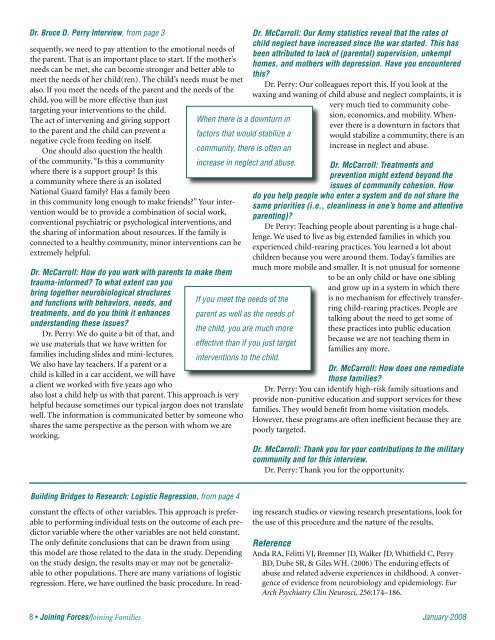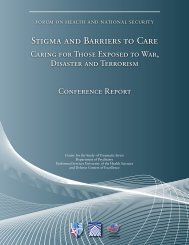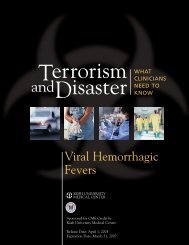An Interview With Bruce D. Perry, MD, PhD - Center for the Study of ...
An Interview With Bruce D. Perry, MD, PhD - Center for the Study of ...
An Interview With Bruce D. Perry, MD, PhD - Center for the Study of ...
You also want an ePaper? Increase the reach of your titles
YUMPU automatically turns print PDFs into web optimized ePapers that Google loves.
Dr. <strong>Bruce</strong> D. <strong>Perry</strong> <strong>Interview</strong>, from page 3<br />
sequently, we need to pay attention to <strong>the</strong> emotional needs <strong>of</strong><br />
<strong>the</strong> parent. That is an important place to start. If <strong>the</strong> mo<strong>the</strong>r’s<br />
needs can be met, she can become stronger and better able to<br />
meet <strong>the</strong> needs <strong>of</strong> her child(ren). The child’s needs must be met<br />
also. If you meet <strong>the</strong> needs <strong>of</strong> <strong>the</strong> parent and <strong>the</strong> needs <strong>of</strong> <strong>the</strong><br />
child, you will be more effective than just<br />
targeting your interventions to <strong>the</strong> child.<br />
The act <strong>of</strong> intervening and giving support<br />
to <strong>the</strong> parent and <strong>the</strong> child can prevent a<br />
negative cycle from feeding on itself.<br />
One should also question <strong>the</strong> health<br />
<strong>of</strong> <strong>the</strong> community. “Is this a community<br />
where <strong>the</strong>re is a support group? Is this<br />
a community where <strong>the</strong>re is an isolated<br />
National Guard family? Has a family been<br />
in this community long enough to make friends?” Your intervention<br />
would be to provide a combination <strong>of</strong> social work,<br />
conventional psychiatric or psychological interventions, and<br />
<strong>the</strong> sharing <strong>of</strong> in<strong>for</strong>mation about resources. If <strong>the</strong> family is<br />
connected to a healthy community, minor interventions can be<br />
extremely helpful.<br />
When <strong>the</strong>re is a downturn in<br />
factors that would stabilize a<br />
community, <strong>the</strong>re is <strong>of</strong>ten an<br />
increase in neglect and abuse.<br />
Dr. McCarroll: How do you work with parents to make <strong>the</strong>m<br />
trauma-in<strong>for</strong>med? To what extent can you<br />
bring toge<strong>the</strong>r neurobiological structures<br />
and functions with behaviors, needs, and<br />
treatments, and do you think it enhances<br />
understanding <strong>the</strong>se issues?<br />
Dr. <strong>Perry</strong>: We do quite a bit <strong>of</strong> that, and<br />
we use materials that we have written <strong>for</strong><br />
families including slides and mini-lectures.<br />
We also have lay teachers. If a parent or a<br />
child is killed in a car accident, we will have<br />
a client we worked with five years ago who<br />
also lost a child help us with that parent. This approach is very<br />
helpful because sometimes our typical jargon does not translate<br />
well. The in<strong>for</strong>mation is communicated better by someone who<br />
shares <strong>the</strong> same perspective as <strong>the</strong> person with whom we are<br />
working.<br />
If you meet <strong>the</strong> needs <strong>of</strong> <strong>the</strong><br />
parent as well as <strong>the</strong> needs <strong>of</strong><br />
<strong>the</strong> child, you are much more<br />
effective than if you just target<br />
interventions to <strong>the</strong> child.<br />
Dr. McCarroll: Our Army statistics reveal that <strong>the</strong> rates <strong>of</strong><br />
child neglect have increased since <strong>the</strong> war started. This has<br />
been attributed to lack <strong>of</strong> (parental) supervision, unkempt<br />
homes, and mo<strong>the</strong>rs with depression. Have you encountered<br />
this?<br />
Dr. <strong>Perry</strong>: Our colleagues report this. If you look at <strong>the</strong><br />
waxing and waning <strong>of</strong> child abuse and neglect complaints, it is<br />
very much tied to community cohesion,<br />
economics, and mobility. Whenever<br />
<strong>the</strong>re is a downturn in factors that<br />
would stabilize a community, <strong>the</strong>re is an<br />
increase in neglect and abuse.<br />
Dr. McCarroll: Treatments and<br />
prevention might extend beyond <strong>the</strong><br />
issues <strong>of</strong> community cohesion. How<br />
do you help people who enter a system and do not share <strong>the</strong><br />
same priorities (i.e., cleanliness in one’s home and attentive<br />
parenting)?<br />
Dr <strong>Perry</strong>: Teaching people about parenting is a huge challenge.<br />
We used to live as big extended families in which you<br />
experienced child-rearing practices. You learned a lot about<br />
children because you were around <strong>the</strong>m. Today’s families are<br />
much more mobile and smaller. It is not unusual <strong>for</strong> someone<br />
to be an only child or have one sibling<br />
and grow up in a system in which <strong>the</strong>re<br />
is no mechanism <strong>for</strong> effectively transferring<br />
child-rearing practices. People are<br />
talking about <strong>the</strong> need to get some <strong>of</strong><br />
<strong>the</strong>se practices into public education<br />
because we are not teaching <strong>the</strong>m in<br />
families any more.<br />
Dr. McCarroll: How does one remediate<br />
those families?<br />
Dr. <strong>Perry</strong>: You can identify high-risk family situations and<br />
provide non-punitive education and support services <strong>for</strong> <strong>the</strong>se<br />
families. They would benefit from home visitation models.<br />
However, <strong>the</strong>se programs are <strong>of</strong>ten inefficient because <strong>the</strong>y are<br />
poorly targeted.<br />
Dr. McCarroll: Thank you <strong>for</strong> your contributions to <strong>the</strong> military<br />
community and <strong>for</strong> this interview.<br />
Dr. <strong>Perry</strong>: Thank you <strong>for</strong> <strong>the</strong> opportunity.<br />
Building Bridges to Research: Logistic Regression, from page 4<br />
constant <strong>the</strong> effects <strong>of</strong> o<strong>the</strong>r variables. This approach is preferable<br />
to per<strong>for</strong>ming individual tests on <strong>the</strong> outcome <strong>of</strong> each predictor<br />
variable where <strong>the</strong> o<strong>the</strong>r variables are not held constant.<br />
The only definite conclusions that can be drawn from using<br />
this model are those related to <strong>the</strong> data in <strong>the</strong> study. Depending<br />
on <strong>the</strong> study design, <strong>the</strong> results may or may not be generalizable<br />
to o<strong>the</strong>r populations. There are many variations <strong>of</strong> logistic<br />
regression. Here, we have outlined <strong>the</strong> basic procedure. In reading<br />
research studies or viewing research presentations, look <strong>for</strong><br />
<strong>the</strong> use <strong>of</strong> this procedure and <strong>the</strong> nature <strong>of</strong> <strong>the</strong> results.<br />
Reference<br />
<strong>An</strong>da RA, Felitti VJ, Bremner JD, Walker JD, Whitfield C, <strong>Perry</strong><br />
BD, Dube SR, & Giles WH. (2006) The enduring effects <strong>of</strong><br />
abuse and related adverse experiences in childhood. A convergence<br />
<strong>of</strong> evidence from neurobiology and epidemiology. Eur<br />
Arch Psychiatry Clin Neurosci, 256:174–186.<br />
8 • Joining Forces/Joining Families January 2008




